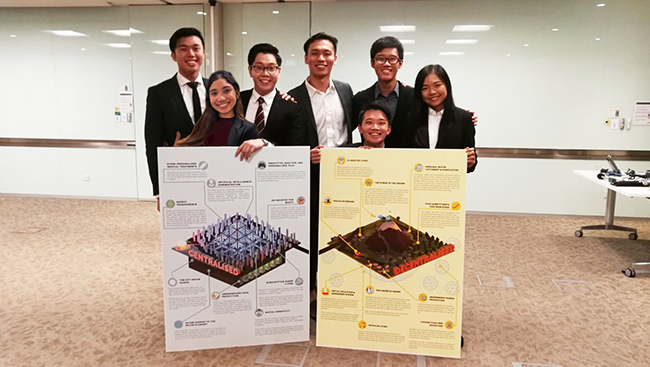Champion in Shell Imagine the Future Scenario Competition 2019

About the Competition: Shell’s Imagine the Future Scenario Competition challenges teams to build scenarios to imagine the future of more and cleaner energy in Asian cities and how we would live, work, and play in that future.
Date of the competition: 17 January 2019
Achievement: National Champions
REP Students: Kam Jun Hao, Jeshua Lin, Mao Jiawei, Jason Lee, Mark Wei, Nithya Krishnan
Product/Proposal: The Centralised World vs The Decentralised World
Description: In their report, they envision the future of energy usage in a world largely dictated by climate degradation. Using Mumbai as a case study, they first identified the critical trends taking place in the Asia-Pacific Region today, before analysing how these trends would interact with each other to take us from 2020 to 2050, culminating in two unique scenarios.
Their first scenario is the Centralised world. In a world rocked by climate change, they look to our leaders for guidance, and band together as one society. Governments and large corporations hold tremendous influence over our day to day lives and executive decision making, allow much more resources to be pooled together to effect widespread changes. However, their privacy and individual determination are largely eschewed in favour of collective security and expedited advancement, and there is extreme disparity between those who manage to keep pace with the rate of change, and those who are left behind.
Their second scenario is the Decentralised world. As cities fall prey to ecological disaster and social upheaval, a new generation of climate migrants makes its home in previously uninhabited hinterlands. Self-determination and individual agency take precedence over government regulations. In this world, localised problems demand highly specific solutions that are targeted and adapted to individual communities. However, even though we manage to preserve our individual freedoms and right to privacy, the disjointed, laissez-faire nature of our world hinders our ability to pool enough resources to effect widespread change and formulate revolutionary innovations.














/enri-thumbnails/careeropportunities1f0caf1c-a12d-479c-be7c-3c04e085c617.tmb-mega-menu.jpg?Culture=en&sfvrsn=d7261e3b_1)

/cradle-thumbnails/research-capabilities1516d0ba63aa44f0b4ee77a8c05263b2.tmb-mega-menu.jpg?Culture=en&sfvrsn=1bc94f8_1)

7e6fdc03-9018-4d08-9a98-8a21acbc37ba.tmb-mega-menu.jpg?Culture=en&sfvrsn=7deaf618_1)
